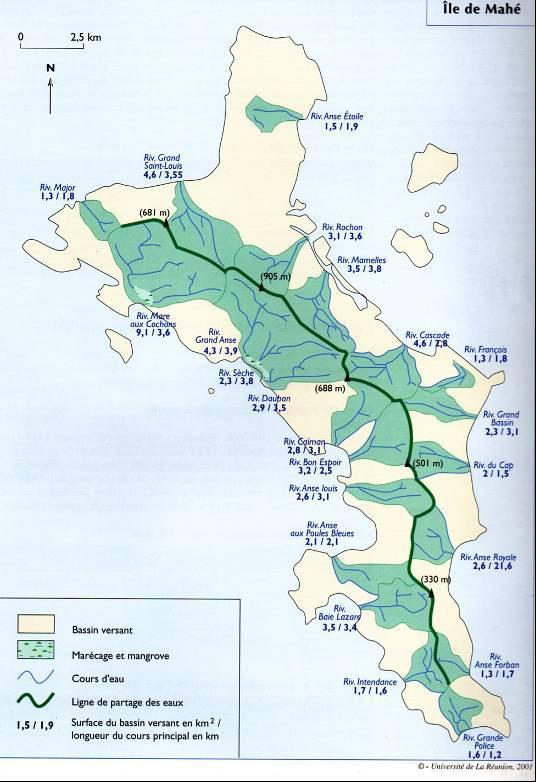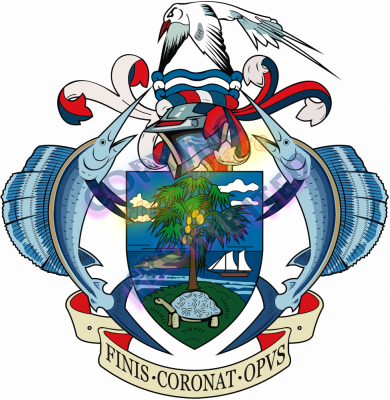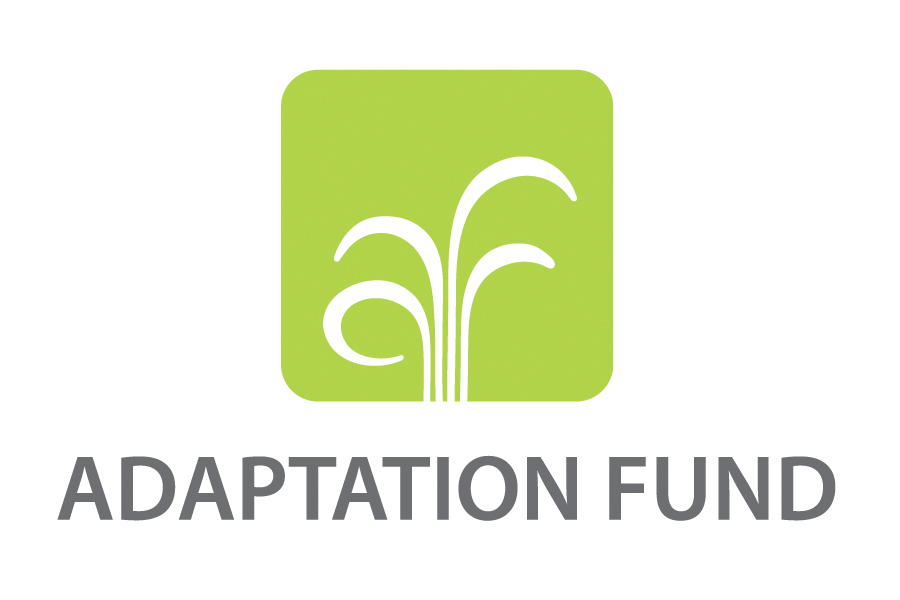Ecosystem Based Adaptation in Seychelles
Project Overview
This project (2014-2022) sought to reduce the vulnerability of the Seychelles to climate change, focusing on two key issues—water scarcity and flooding.
Climate change projections in the Seychelles show that rainfall, while increasing in overall terms, will become even more irregular. Much of the precipitation is falling in sharp bursts, creating heavy flooding in the wet season, while imposing extended period of drought during the dry season. As the country does not have a large water storage capacity, and the topography of the islands constrains such infrastructure, water supplies are heavily dependent on rainfall. Furthermore, the coastal zone is vulnerable to flooding as a consequence of rising sea surface levels, and increased storm surges from cyclonic activity in the Western Indian Ocean.
The project reduced these vulnerabilities by spearheading ecosystem-based adaptation as climate change risk management—restoring ecosystem functionality, and enhancing ecosystem resilience and sustaining watershed and coastal processes in order to secure critical water provisioning and flood attenuation ecosystem services from watersheds and coastal areas.
Project Details
The Seychelles is economically, culturally and environmentally vulnerable to the effects of climate change and associated extreme weather events. The effects of climate change are already noticeable in Seychelles and these effects and their associated impacts are projected to escalate in the future. The two biggest climate change vulnerabilities are water scarcity and coastal flooding.
Freshwater is crucial both for human needs (e.g. drinking and sanitation) as well as other sectoral uses that are intrinsic to the development process (e.g. tourism/agriculture). Although the country receives a relatively high average annual precipitation quotient of 2,200 mm of rainfall, the Seychelles is considered to be “water stressed”. The impacts of climate change on Seychelles‘ water resources are expected to be severe. The dry southeast monsoon season is expected to become drier and the period between rainfall events during this season is likely to become longer. This will have impacts on stream flow. The water storage capacity in Seychelles will be severely challenged as a consequence.
Ecosystems play an important role in determining the vulnerability of communities to climate change—particularly in Small Island Developing States such as the Seychelles. The forests and wetlands of the granitic islands play an important role in regulating stream flows and water quality. Forested land binds the soil, thereby decreasing soil erosion and increasing the capacity of soils to absorb and retain water. This allows water to penetrate deeper into the soil, allowing for less runoff and slower release. Wetlands and riparian vegetation also assist in reducing erosion slowing water discharge over a longer period of time. This will have two benefits in ameliorating the effects of climate change on water supplies - providing more regular stream flow during the lengthier dry season, and buffering against flooding following intense rainfall events. Similarly, mangroves and fringing coral reefs protect coastal land against coastal erosion, while coastal sand dunes and wetlands play an important role in controlling coastal flooding. These flood attenuation services are likely to be critical given projected climate change induced flooding risks.
The project will implement results-oriented ecosystem based adaptation measures centered on the issues and opportunities identified by local stakeholders. It will focus on the development and application of technological solutions and tools for resolving specific vulnerability issues as a result of climate change in the main granitic islands of Seychelles. In doing so, it will build on technologies that have been used in similar contexts, or successfully tested at a pilot scale in the Seychelles (e.g., forest rehabilitation). The overall approach is to work from the level of technical solutions at specific watershed/coastal sites to the policy and regulatory level, such that future replication of adaptation measures will be catalysed, supported by new policies, guidelines, and awareness of watershed stewardship. Communities will be increasingly climate resilient and able to protect water supply and livelihoods that are linked to the integrity of the watersheds and coastal ecosystems on the Granitic islands.
Key Results and Outputs
Component 1: Ecosystem-based adaptation approach to enhancing freshwater security
Finance technology development and application to restore riparian areas, including forests and wetlands (Output 1.1), and manage forest catchments to enhance climate change resilience, including integrated wildfire management (Output 1.2). Design and construct small-scale artificial raw water storage facilities in critical waterways (Output 1.3).
Component 2: Ecosystem-based adaptation approaches along the shorelines of the Granitic Islands
Restore and protect critical ecosystems, including mangrove forests, sand dunes, wetlands, and coral reefs through planting and removal of alien species (Output 2.1). Enhance adaptive capacity of vulnerable communities and resource users by establishing local-level bodies and training in Ecosystem-Based Adaptation methodologies (Output 2.2).
Component 3: Ecosystem based adaptation mainstreamed into development planning and financing
Mainstream EBA into land/water planning and regulation processes (Output 3.1) while creating/enhancing institutional mechanisms that internalize climate change risks into coastal zone management planning (Output 3.2). Capture and disseminate EBA applications (Output 3.3) and plan for up-scaling of best practices (Output 3.4).
Reports and Publications
PIFs
Monitoring and Evaluation
The monitoring and evaluation (M&E) scheme will be applied in accordance with the established UNDP procedures throughout the project lifetime. As an implementing partner, MHAETE, together with the UNDP Mauritius/Seychelles will ensure the timeliness and quality of the project implementation. Technical guidance and oversight will be also provided from the UNDP‘s Regional Bureau for Southern Eastern Africa, as well as the Project Board (PB). Audits on the project will follow UNDP finance regulations and rules and applicable audit policies.
Project start: A Project Inception Workshop (IW) will be held within the first 3 months of project start with those with assigned roles in the project management, AF, UNDP CO and where appropriate/feasible, regional technical advisors as well as other stakeholders. The IW is crucial to building ownership for the project results and to plan the first year annual work plan.
Annual Progress Report. An Annual Progress Report (APR) shall be prepared by the Project Manager, shared with the Project Board and submitted to the Donor. The APR will be prepared with progresses against set goals, objectives and targets, lessons learned, risk management and detailed financial disbursements.
Mid-term of the project cycle: The project will undergo an independent Mid-Term Evaluation (MTE) at the mid-point of project implementation (September 2015). The MTE will determine progress being made toward the achievement of outcomes and will identify course correction if needed. It will focus on the effectiveness, efficiency and timeliness of project implementation; will highlight issues requiring decisions and actions; and will present initial lessons learned about project design, implementation and management. The findings of this review will be incorporated as recommendations for enhanced implementation during the final half of the project‘s term.
Periodic Monitoring through site visits: UNDP Mauritius/Seychelles will conduct visits to project sites based on the agreed schedule in the project's Annual Work Plan to assess, at first hand, project progress. Other members of the PB may also join these visits.
Project Closure: An independent Final Evaluation will be undertaken 3 months prior to the final PB meeting. The final evaluation will focus on the delivery of the project‘s results as initially planned and as corrected after the mid-term evaluation, if any such correction takes place. The final evaluation will look at impact and sustainability of results, including the contribution to capacity development and the achievement of global environmental benefits/goals.



